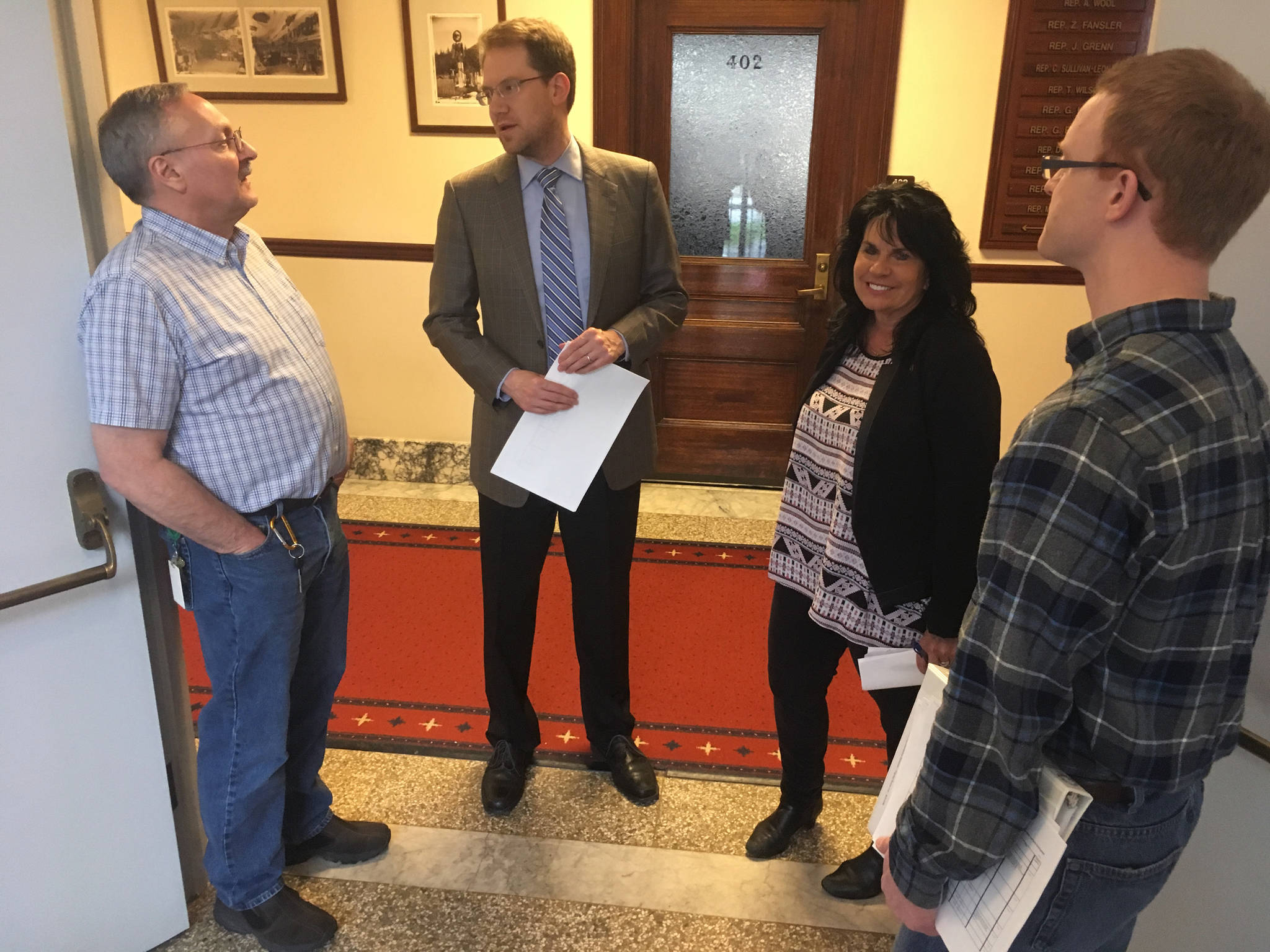The Alaska Legislature is close to a deal to avert a statewide government shutdown, legislative leaders say, and an agreement could come as quickly as Thursday.
“I think we, the Senate, should be done tomorrow. If it hits the floor, we’ll be done tomorrow,” said Senate President Pete Kelly, R-Fairbanks, in a Wednesday interview with the Empire.
“I think tomorrow will be a good day. I’m anticipating we’ll be out of there by the weekend. I think we’re that close,” said House Minority Leader Charisse Millett, R-Anchorage, on the same day.
In a brief hallway conversation, Speaker of the House Bryce Edgmon said he agrees with what Kelly said. Edgmon, busy in meetings and negotiations all day ─ members of the Senate Majority were seeing entering and leaving his office ─ did not have time for a more detailed conversation.
“I couldn’t say we have an agreement between leadership yet. That just hasn’t happened,” Kelly said early Wednesday afternoon, but one appeared imminent.
“I think you never know until you see a vote,” said Rep. Les Gara, D-Anchorage. “I would say that it seems like people are working with each other well.”
The Legislature must approve a state operating budget before July 1, the start of the state’s fiscal year, to avoid a shutdown of state services.
Until this week, lawmakers have been stalemated between positions held by the Republican-dominated Senate Majority and the coalition House Majority, which includes independents, Democrats and Republicans. The Senate Majority has advocated passage of a stopgap budget that uses savings to avoid a shutdown. The House Majority has demanded a comprehensive fiscal plan that avoids a shutdown and addresses Alaska’s $2.7 billion annual deficit.
Edgmon has said that tackling the deficit next year will be difficult because 2018 is an election year, and lawmakers will be reluctant to make unpopular choices in an election year. Furthermore, Alaska has only one year left in its Constitutional Budget Reserve.
Gov. Bill Walker broke the impasse when he called a second special session last week. Lawmakers were in its sixth day Wednesday. Walker put only one thing on the second special session agenda: the budget.
That meant the House Majority’s position was no longer sustainable because none of its supporting pieces ─ new taxes, cuts to oil drilling subsidies ─ were on the agenda.
“I think the governor limiting the call to the operating budget was the actual genesis (of a breakthrough),” Millett said. “Now you don’t have any leverage whether it’s (House Bill) 111 or the capital budget or with income taxes or with a broad-based tax. All of those things have been removed as distractions … and I think the clock is ticking.”
With nothing else to consider, lawmakers have focused negotiations on how much to cut from the state’s operating budget. That has put the issue in the collective lap of the six-person conference committee assigned to reconcile the different budgets passed by the House and Senate earlier this year.
On Wednesday, that committee closed out all but a handful of isolated elements. It had previously agreed to some less controversial departmental budgets but this week has begun settling the “big four” departments that include most state spending.
Those four departments ─ education, health, transportation and the University of Alaska ─ had been targeted for significant cuts by the Senate Majority. The House Majority had resisted those cuts but is now compromising.
In one item approved Wednesday, the conference committee rejected a $16.2 million cut to the University of Alaska budget and instead approved an $8 million cut, half what the Senate had sought.
Contentious items still remain to be considered, including how much money the state will give to oil and gas drillers in subsidy payments, but there are few of those compared to what has already been done.
“Items are getting checked off all the time, so we’re getting closer all the time. There’s not too many open,” said Rep. Paul Seaton, R-Homer and House chairman of the conference committee.
The conference committee is scheduled to meet at 10 a.m. Thursday to complete its budget work. If it settles the last remaining elements, the budget would then go to the full House and full Senate. Each body has scheduled a floor session on Thursday and could vote as soon as it receives the budget.
The issue will then become whether there are enough votes to use the state’s Constitutional Budget Reserve to cover the deficit. A three-quarters vote of the Senate and a three-quarters vote of the House is needed. In the House, the support of Millett’s minority Republicans is required.
“We’ll caucus tomorrow and look at what gets closed out tomorrow in conference,” Millett said, not making a commitment. “All 18 of our members need to understand what we’re asking with that CBR vote.”
She’d like to see her caucus vote together but understands that some “super-fiscal conservatives” may not be willing to do so.
In the end, how close are legislators to a deal?
“Closer than we’ve ever been before,” said Sen. Donny Olson, D-Nome and the Senate Minority member of the budget conference committee.
Contact reporter James Brooks at james.k.brooks@juneauempire.com or call 419-7732.

